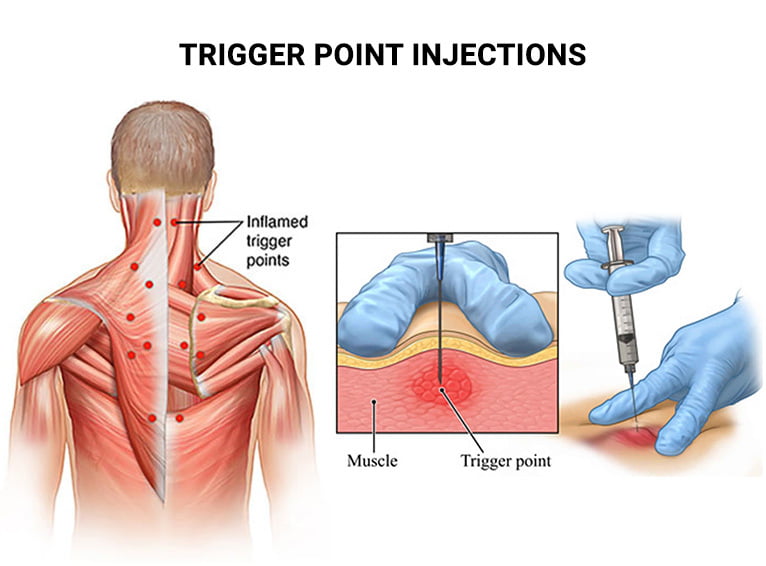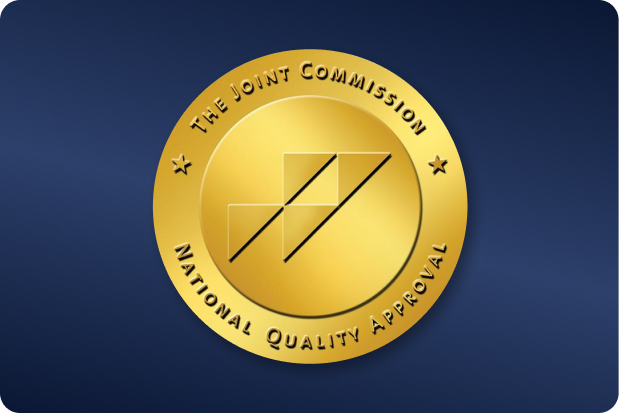 Same-day Appointments Book Online
Call to book 201.523.9590
Same-day Appointments Book Online
Call to book 201.523.9590
 Same-day Appointments Book Online
Call to book 201.523.9590
Same-day Appointments Book Online
Call to book 201.523.9590
Table of contents
These injections deliver immediate relief and usually take care of the problem permanently. At the Spine & Rehab Group in NYC and northern New Jersey, you find experts in trigger point pain and the most effective treatments. Call today for a consultation.

A trigger point is a discrete, focal and hyperirritable nodule in the taut band of the skeletal muscles’ fascia. The fascia is an area in the muscle or connective tissue that’s painful when pressed. Trigger points, like acupressure points or acupuncture points, can feel like knots beneath your skin, and they’re common in your upper back and shoulder areas.
Trigger point pain accompanies most chronic musculoskeletal disorders. The pain may also develop with advancing age or from shoulder injuries, knee injuries or other joint problems and conditions. A knowledgeable pain specialist can press on the trigger point with concentrated amounts of pressure to relieve muscle spasms. A trigger point injection with pain-relieving medication is another pain management option.
If you suffer from lower back pain, upper back pain or middle back pain caused by spinal problems, Dr. Amr Hosny and the expert spine doctors at the Spine & Rehab Group know how to help. Based in New York City and the surrounding New Jersey counties of Morris, Union and Bergen, these spine specialists rely on the latest pain relief techniques, including trigger point injections.
A myofascial trigger point injection is a pain management technique that involves injecting medication directly into myofascial trigger points. It’s used as a pain treatment for muscles containing trigger points. The formation of trigger points in tense muscles can irritate surrounding nerves, causing referred pain in other parts of your body too.
The injection can contain a variety of medications, depending on your specific needs, including:
If you suffer from chronic pain that doesn’t go away with conservative treatment, trigger point injections offer a more effective treatment. Dr. Hosny is a board-certified, Harvard trained interventional spine specialist who treats body pain through the latest interventional techniques. Visit one of the locations of the Spine & Rehab Group for the best pain relief treatments.
 Amr Hosny, MD, MBA, FASA
Book Now
Amr Hosny, MD, MBA, FASA
Book Now
 David Chu, MD, FAAPMR
Book Now
David Chu, MD, FAAPMR
Book Now
 Vivek Mehta, MD, FAAPMR
Book Now
Vivek Mehta, MD, FAAPMR
Book Now
 Deepali Gupta, MD, DABA, DABPM
Book Now
Deepali Gupta, MD, DABA, DABPM
Book Now


A trigger point injection can deliver pain relief to different parts of your body. After a diagnosis, your doctor determines if the condition causing your muscle pain qualifies for a trigger point injection. Trigger point injections soothe muscle pain in your arms, legs, lower back and neck. Trigger point injections for migraines and headaches are also effective.
This pain treatment relieves a wide range of conditions, including:
Your spine doctor leverages the latest diagnostic equipment to determine the cause of your muscle pain. From the examination and imaging test results, in conjunction with a thorough medical history and physical exam, your spine doctor determines if a trigger point injection is the best option for you.
Trigger point injections are highly effective for muscle pain and headaches.
Your spine specialist may recommend a trigger point injection if you have symptoms that include:
These symptoms point to trigger point pain. Your doctor considers these symptoms when creating your treatment plan.
Trigger point injections aren’t recommended, however, if you:
I have a terrible back...comes from years of abuse and not taking care of myself...For quite sometime I enured excruciating pain in my back -the first time I was introduced to Dr. Hosny and The Spine & Rehab Group it was because I was having terrible pain in my cocyx -couldn't sit, lie down- any movement was painful- I found Dr.Hosny ...and after a few treatments- I was able to rejoin the human race- he is professional-willing to answer any and all questions- explains exactly what and why he is doing what he does ... the entire office was so very professional-I felt I was ingood hands...never again will I go thru the pain I did ..he is a lifesaver!
Now I have sciatica..and am having injections into the nerves around my sacrum... if anyone can deliver me from this back pain- Amr Hosny , MD can!
Visiting Dr. Hosny felt like visiting a family member who is a doctor. When I told him that I don't have Insurance, he told me that he is not interested in the money, he is only interested in helping me to get rid of my pain! He made it affordable for me to receive a much needed facet Injection, and best of all he relieved me from my pain as he had told me he would. With 17 years of experience doing thousands of injections i felt very safe and comfortable!!! Everybody working with him was very kind and always helpful! If you are going through pain, don't wait anymore! Go see Dr. Hosny and get your life back!
Gonca G.This is a short, in-office appointment. The treatment starts with an exhaustive medical examination and imaging tests, if needed.
During the procedure:
Targeted exercises, proper diet and massage can help prevent the return of the trigger point. If you experience consistent pain that alters your quality of life, contact the pain specialists at the Spine & Rehab Group. Our pain center team treats a diverse range of conditions to ease the pain and restore proper function. They can discuss alternatives to trigger point injections, such as physical therapy, anti-inflammatory steroid injections, radiofrequency ablation and, as a last resort, surgery.

Dr. Hosny is a distinguished physician, educator, and healthcare leader with a commitment to advancing health equity and accessibility in the rapidly evolving landscape of modern healthcare. After completing his residency at St. Luke's Roosevelt Hospital Center, affiliated with Columbia University in New York City, he pursued an Interventional Spine Fellowship at Beth Israel Deaconess Medical Center, part of Harvard Medical School in Boston, MA.
Dr. Hosny has held prominent roles in academic medicine, including serving as an Associate Clinical Professor at New York Medical College and as the Interventional Spine Fellowship Program Director. These positions reflect his dedication to mentoring the next generation of healthcare professionals and advancing the field of interventional spine care.
More About Dr. HosnyThe Spine & Rehab Group
140 NJ-17,
Paramus, NJ 07652
(212) 242-8160



